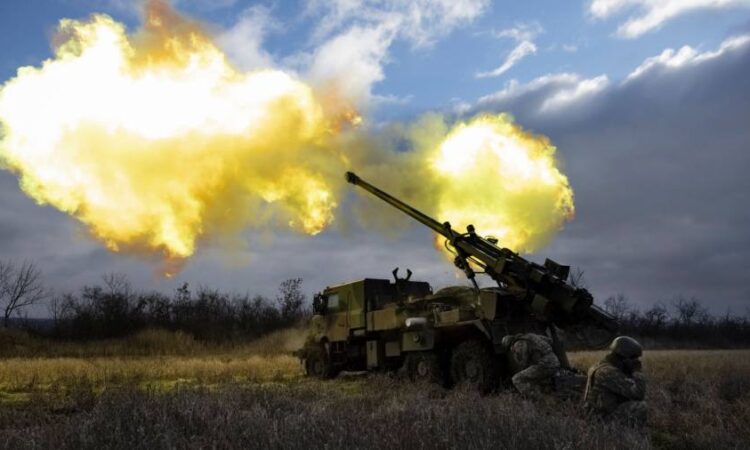
Europe’s push to make arms for Ukraine has been hobbled by a shortage of explosives, which industry insiders fear will delay efforts to boost shell production by as much as three years.
Scarce supplies of gunpowder, plastic explosives and TNT have left industry unable to rapidly meet expected EU orders for Ukraine, regardless of how much money is thrown at the problem, according to officials and producers.
The supply chain constraints underline how Russia’s invasion of Ukraine has badly exposed Europe’s inadequate arms stocks and weak domestic production capacity, run down by decades of under-investment.
“The fundamental problem is that the European defence industry is not in good shape for large-scale war production,” said one German official.
Europe is trying to meet Kyiv’s war fighting needs by pumping cash into the defence sector, particularly to encourage expansion of 155mm artillery production. There is dire need for shells, both to restock national armouries and maintain supplies to Ukrainian forces.
But producers, industry executives and EU officials warn increased demand may only push up prices that have already jumped a fifth over the past year.
“It’s very difficult to increase production of artillery ammunition, especially the heavy, large-calibre ammunition, in a short time,” said Jiří Hynek, chair of the Defence and Security Industry Association of the Czech Republic. “A new artillery factory is very easy, but how to produce more artillery projectiles without raw materials?”
The comments come ahead of a meeting of EU foreign and defence ministers in Brussels on Monday to discuss a package of two €1bn proposals to speed up immediate 155mm shipments to Ukraine and incentivise countries to form joint artillery purchase contracts.

Defence industry officials say Europe has a limited supply of explosives such as gunpowder, TNT and nitrocellulose which are necessary to produce shells. “The bottlenecks for our capacity are mainly [explosive] powders, which are in short supply all over Europe,” said one.
“It’s not possible to increase, in a short time, nitrocellulose [production] . . . In Europe there are no important producers of the raw materials we need,” said Hynek, referring to a main ingredient of gunpowder. “If I want to increase production of gunpowder I need probably three years.”
Explosia, a Czech state-owned manufacturer that is one of Europe’s largest suppliers of explosives to ammunition factories, told the FT that its production of propellants used in 155mm artillery is “running at full capacity” and would not be increased until 2026.
“Investments are under way to further increase our production capacity, but this is a three-year project, not a few months’ job,” said Martin Vencl, the company’s spokesperson.
This week Romania’s government said it was in talks with US and South Korean companies to build a gunpowder factory in the country. Its last such plant was shut down in 2004.
Even EU officials who have championed the financial incentive packages privately admit that European artillery producers have made clear to them that scaling up output will not be an easy task.
“We’re in favour of strengthening the defence industry. But if the result of this EU initiative is that you have a second bidder for the same scarce resource, that will have an impact on price,” said one German official. “And the arms companies are getting rich enough already.”
“We have to tread with care . . . No one wants to subsidise companies that are already coining it in,” he added.
Fábrica Municiones de Granada (FMG), one of Spain’s two 155mm artillery producers, has been operating at full capacity since last October, producing shells for a trading company that sells them on to Ukraine. But Antonio Caro, FMG’s director-general, said it had taken four-to-five months to scale up because of the difficulty of obtaining basic materials and components.
“Our main problem is primary materials,” Caro said. “Supplies for ammunition are very strained around the world because all the factories, like us, are at 100 per cent.”
“There aren’t too many factories [producing materials like TNT and nitrocellulose] in Europe and they’re at 100 per cent too, so we have to start looking in India, in Korea, in other countries further away,” he said.
Gianclaudio Torlizzi, an adviser to Italy’s defence ministry, agreed, saying: “We need to find new sources of supply . . . from countries we had not traditionally approached,” he said. “Each European country wants to protect its availability of raw materials.”
The cost of basic materials had “doubled and in some cases tripled”, Caro said. Those increases and the surge in demand had led to higher prices for munitions, although the rise has been less pronounced. A typical shell today costs €850, roughly 20 per cent more than before the Russian invasion, he said.
For now FMG, which is owned by Slovak group MSM, has no plans to increase capacity further. “Hopefully the war will be over soon,” Caro said.
MSM also produces 155mm shells in Slovakia and said it “plans to build a new production hall” to increase artillery output, but declined to provide a timeline.
Additional reporting by Raphael Minder in Warsaw and Amy Kazmin in Rome






